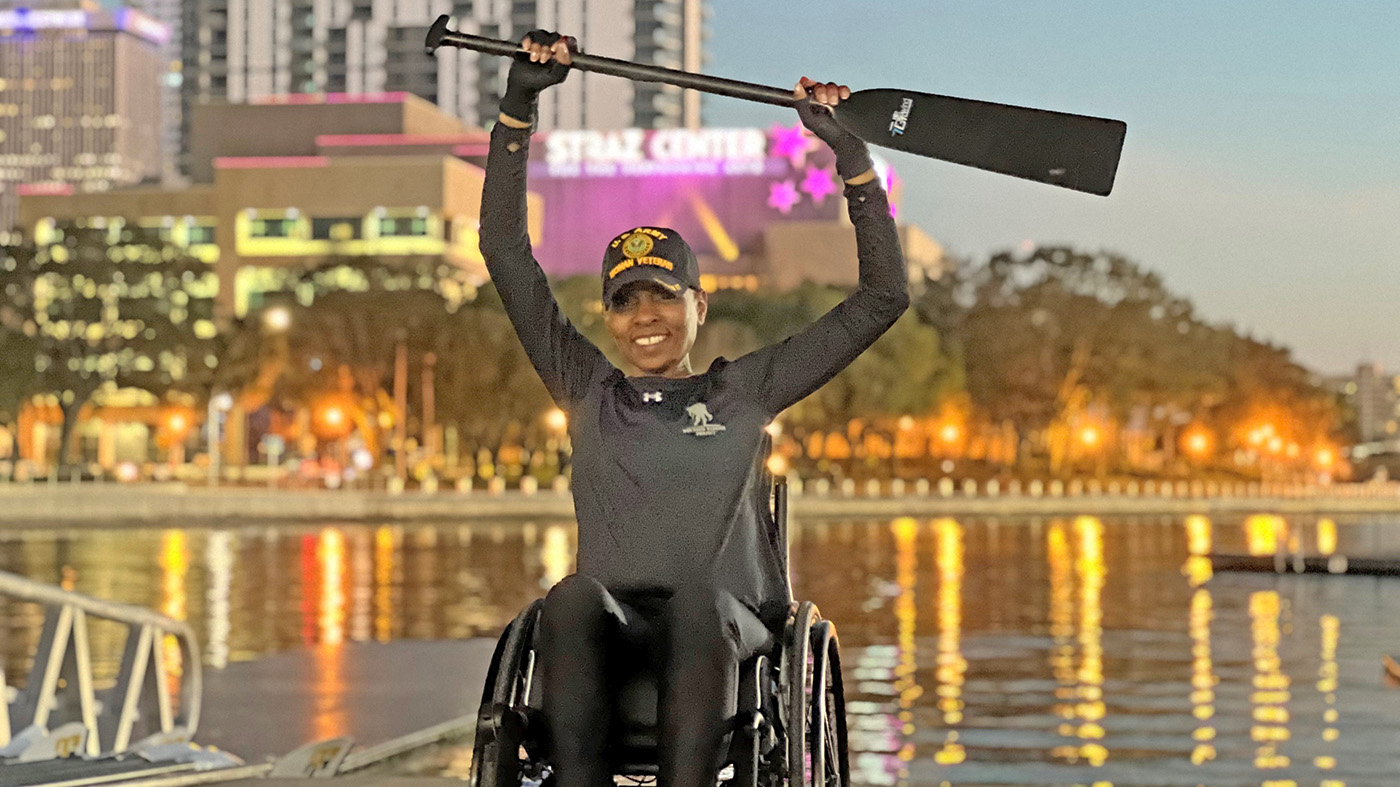In the third guest blog post in this series, Harvard Extension School Lecturer Cynthia A. Meyersburg, Ph.D., guides student Veterans on how to prepare for and succeed when returning to an academic school. This post examines tactics for achieving good grades. Read parts 1 and 2.
Participating in discussions
Participating in classroom discussions can bring valuable experiences for student Veterans. Your own experiences in the military mean you likely will have greater maturity and different life experiences than most of your classmates. You have important contributions to make to discussions, both inside and outside of the classroom.
Remember: In discussions, students should take turns talking. Make sure you both listen to your classmates and contribute to discussions. Strive to show respect and kindness to your classmates. Here, you also will discover that people with views very different from your own sometimes can have valuable insights and ideas. Sometimes you may have to show restraint and patience with classmates who are not as mature as you are.
While it is acceptable (and even expected) to disagree in discussions, and to offer alternate views and counter-points, make sure disagreements don’t turn into personal attacks. By striving for tolerance of (and even compassion toward) people who are misinformed or under-informed about the military, and if you correct misinformation calmly and kindly, these people may have an easier time hearing what you have to say.
Before sharing personal information, ask yourself whether or not you really want to share that information. Once you reveal something, it may be shared with others outside of class. The best professors will treat all students with kindness and respect.
My favorite piece of advice
If someone asks you a question you don’t feel comfortable answering, reply with, “Why do you ask?” The other person’s answer may help you decide if and how you wish to answer. It also provides you with time to consider what you do (or do not) wish to say. In some instances, your fellow students, or even instructors, may not realize that they are asking an intrusive question.
Academic writing
Academic writing is a skill. Excellent writing does not happen overnight! Make sure you understand what the assignment is – ask if there are any model papers you may read. Break large assignments into manageable pieces. Start your research as soon as possible. Ask your instructor what sorts of reference materials you may use. f your instructor says that you must use scholarly sources and articles, then you may not use Wikipedia or mainstream newspaper and magazine articles.
If you do not have a great deal of experience researching and writing academic papers (and perhaps even if you do), make an appointment to meet with a reference librarian at your school. Librarians are experts in locating information. Most librarians will be genuinely happy to teach you how to find the information you need and to help you problem solve ways to find elusive information. Even the very best university libraries do not have every journal or book you might need. It can take time to request interlibrary loans to get hard to find books and articles. This is one of the reasons to start your research as soon as possible. You also may be able to find on-line tutorials for how to use specific databases you may want (or need) to use.
Put together your references list as you are working on your paper. Trust me: If you wait til later, you will regret not having put your references list together as you were working on your paper. Consider learning how to use Zotero or another similar program to help you organize references.
If it’s not stated in the syllabus, ask your professor if you should use APA, Chicago, MLA, or another format for your paper. On your papers, unless you are told otherwise, use Times New Roman font in 12 point and have one inch margins.
Purdue University provides a wonderful free resource for students: Purdue OWL. On Purdue OWL, you can find information for how to format in APA, Chicago or MLA format, as well as other information, including how to avoid plagiarism, help with improving your grammar and resume writing.
While you are writing rough drafts, try to turn off your inner critic. You can edit and revise after you have written your rough draft. Instead, focus on getting your ideas on the page.
Before submitting any writing, make sure you are writing using appropriate tone. Unless your professor tells you otherwise, avoid slang and contractions. Ask if you should avoid using first person (I, me, we, us, my, & our) or second person (you & your) in your assignments. One resource I especially recommend to student writers is Mignon Fogarty’s (2008) Grammar Girl’s Quick and Dirty Tips for Better Writing. Her grammar guide is helpful, inexpensive, and surprisingly fun to read. Ms. Fogarty also has a second book aimed specifically at student writers.)
Before you turn in any paper, read it aloud to someone else. Reading aloud to someone else makes a tremendous difference: Your listener can let you know if your paper is repetitive, if you’ve left out important information, or are unclear. Based on listener feedback and on your own experience reading the paper, you may be able to make changes that improve its organization. You also may be able to identify and correct logic errors or grammatical problems.
Quizzes, tests and exams
Allocate adequate time to study for academic assessments (quizzes, tests or exams). Start your studying ahead of time, so you can be well prepared for tests. Spread your exam preparation out over several days. Don’t try to do all of your studying the night before an exam. When people put off studying, they then run the risk of having a problem arise at the last minute, such as having a migraine headache or a child with a stomach bug, or even discovering a question about the readings which you would have liked to ask the professor to address or clarify before the exam.
There are various websites and phone applications that offer flashcard and self-quiz opportunities. Memory researchers have found that it’s not the amount of time spent studying which predicts how well students will perform on a memory task, but that it’s the number of times information is recalled that predicts whether or not students will successfully recall the items on a test. Therefore, when you’re studying, continue re-quizzing yourself or having someone else quiz and re-quiz you – even on items that you think you know very well.
Memory consolidation occurs during sleep. You need to have at least one complete REM cycle to consolidate memory; therefore, it may be reasonable to stay up late studying, but pulling an all-nighter is detrimental to your performance on quizzes and tests.
On days you will have a test or exam, dress comfortably. Bring a water bottle and a snack. Make sure you have any supplies you’ll need (such as a few extra sharpened number #2 pencils).
Here is a strategy to help you succeed on multiple choice assessments: Many people who are very successful at taking multiple choice assessments will cover up the possible answers as they are reading the question. Then, without looking at the answers, they will try to think of what the correct answer is. Then they read each answer option carefully: Usually the answer that is closest to the answer they remembered will be the correct answer.
If you’re unsure what the answer is on a multiple choice assessment, see if there are any answers you can eliminate, then make your best guess from among the remaining options.
A final tip for assessment success: Believe you can succeed. Remind yourself that you can accomplish your goals. Make sure you have prepared for the quiz, test or exam, then tell yourself you can do it. If possible, write yourself a positive message on the top of each page of the exam, such as: “I am smart. I work hard. I know this, and I have got this test!”
How to approach an assignment or activity that you don’t want to do
Think about ways in which you may be able to connect your service, your experiences and your expertise to what you’re doing in school. Also consider why your professor included this assignment or activity. What is the goal of the assignment or activity? If the answer is not clear to you, then you may want to stay after class or go to office hours in order to politely ask your professor about the purpose of the assignment. (For instance, you might say: “I am having trouble connecting with this project. I want to do my best work, and I’m having a hard time. Could you explain to me how it is helpful or why we are doing it?”) In some instances, there may be ways to adjust an assignment to make it more interesting to you. But be warned that if you ask for an alternate assignment, it will be your job to justify your professor’s flexibility by doing very good work on the assignment.
And remember, even the very best jobs and careers have aspects that are not enjoyable. This also is true of being a student.
A final note
As you move forward, never doubt that many, many people are cheering for you. People want you to grow, to find new ways to contribute, to find ways to build on what you already have accomplished and learned, and for you to succeed. The people cheering for you may include people with whom you have served, your family, your friends, your community members, your instructors, and people (including me) who do not personally know you but are grateful for your service.
Suggested Activities:
- Choose two or more of this article’s strategies and tactics for academic success. How can you implement these strategies or tactics to help you succeed?
- What strategies or tactics that you learned in the military can you use to help you succeed as a student?
Cynthia A. Meyersburg, Ph.D., is a lecturer at the Harvard Extension School in the Division of Continuing Education at Harvard University. She thanks retired Air Force Maj. Christopher Kim and Navy Lt. Melinda Mathis, NC, for their contributions and support.
Topics in this story
More Stories
Army Veteran Malika Montgomery says one of the things that helped her live her best life with multiple sclerosis was surrounding herself with positive people.
Acknowledging the issues that Veterans face and working toward solutions is crucial for ensuring they have the support they need to thrive in civilian life.
Last year, Move United hosted 26 adaptive sports competitions in 22 states for 1,537 individual athletes. This year, that number is increasing to 35 events in 24 states for even more Veteran athletes.





